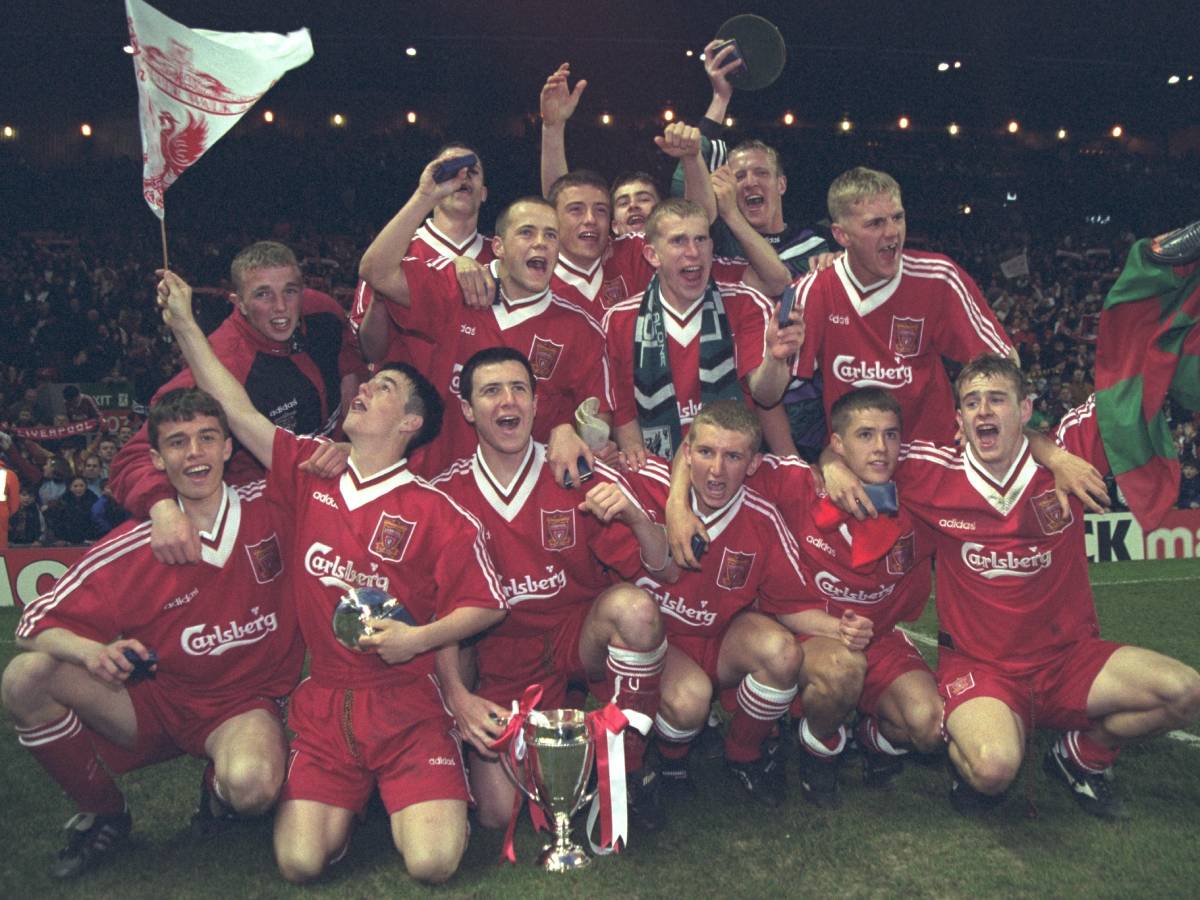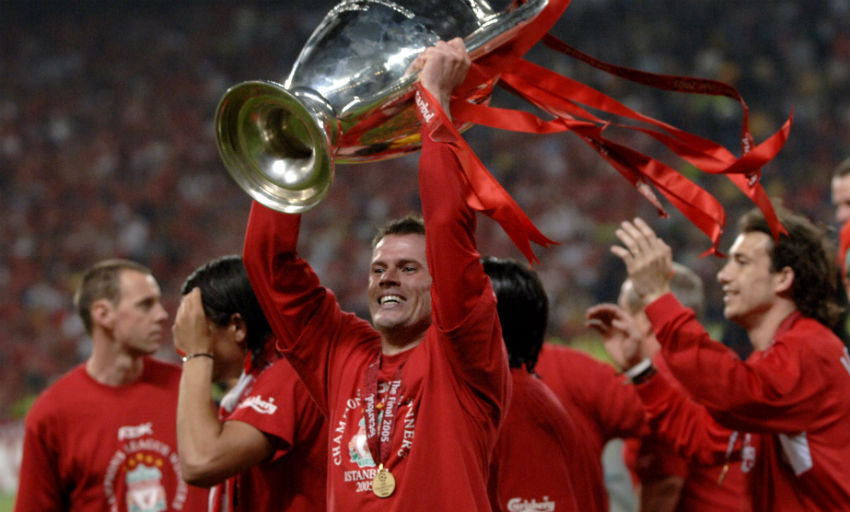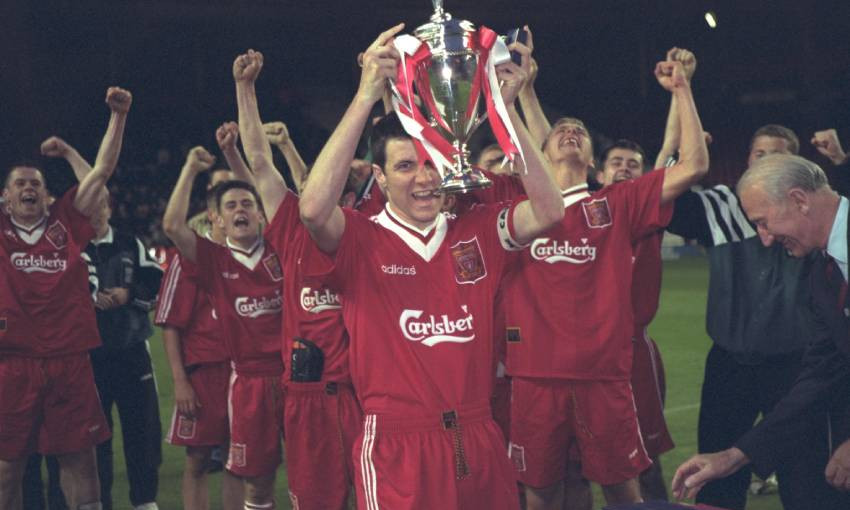Academy alumni: Phil Brazier - the history maker who found his own way
The alumni project run by Liverpool FC's Academy keeps in contact and supports those who have been part of the Kirkby set-up and departed in years gone by.
As part of the scheme – run by Phil Roscoe, the Academy's head of player care – a regular newsletter is distributed featuring an interview with a former player to catch up on their career.
Back in 1996, Phil Brazier captained Liverpool to their first-ever FA Youth Cup triumph. Read on as he reflected on his footballing upbringing at LFC in a recent newsletter...
It’s not easy making history at Liverpool Football Club.
Whatever you do, whatever you win, there’s always some legend who’s got there before you, grabbed the T-shirt and tucked away the medal.
Phil Brazier, though, has a place in the Reds’ history books, which will always be his and his alone.
For in May 1996, he did what no other LFC captain had done before – lifted the FA Youth Cup.

It had been an impressive campaign with a youthful Michael Owen making plenty of headlines.
“We played Man United in the quarter-finals and Michael got a hat-trick,” recalls Brazier, now 43. “I remember Roy Naylor making some world-class saves, too.
“We drew Crystal Palace in the semis, won the first leg 4-2 but then went down to Selhurst Park and went 3-0 down.”
Owen again came to the rescue, with another hat-trick securing a 7-5 aggregate victory and a place in the final against a West Ham side featuring Rio Ferdinand and Frank Lampard.
Brazier credits a trip to Germany before the final as playing a key role in their subsequent victory.
He remembers: “We played a tournament in Dusseldorf and it really galvanised all the players. You could see the progression in the group, growing together. We won the tournament and went down to Upton Park for the first leg of the final and won 2-0.”
There were more than 25,000 in Anfield for the second leg, but nerves weren’t a problem for Brazier, who led a team coached by Steve Heighway and Hughie McAuley with help from Dave Shannon.
“We had played at Anfield numerous times before, so I didn’t have any real nerves,” says the centre-back. “After two minutes you don’t really hear the crowd and you’re concentrating on the job in hand. It’s all about getting the trophy.”
An early Frank Lampard goal gave West Ham hope, but Owen came off the bench to level the game before Stuart Quinn sealed a sweet victory, leaving Brazier to go and collect that trophy.
“It was a little surreal,” he smiles. “It’s unbelievable to know you’re the captain of your boyhood club in your ground, lifting the FA Cup of youth football. Words can’t describe it really! I think we were the first age group that had come all the way through since Steve Heighway was there and we produced the winning side.
“We knew the club had never won the Youth Cup. I had grown up with most of the lads we won it with and been together since we were 10 or 11.
“We were a great bunch of friends and it was like a Sunday League side in a professional setting – I still see some of the lads now.”
Like all youth sides, Liverpool’s 1996 vintage had mixed fortunes in the professional game.
Andy Parkinson and Gareth Roberts would have good careers in the lower leagues, mainly across the Mersey at Tranmere Rovers, while Jon Newby played more than 100 games at Bury, among others.
David Thompson would successfully make the jump to the LFC first team, playing more than 50 games before leaving for the likes of Coventry City and Blackburn Rovers.
Owen, of course, would play almost 300 games for the Reds, scoring 158 goals and winning the Ballon d'Or in 2001 – still the last Englishman to do so – before his switch to Real Madrid.
“Michael was a couple of years younger than us and was at Lilleshall,” Brazier says. “He was a goal machine and you could tell he was going to make it.”
Carragher was a part of the same side but stayed at Liverpool for his whole career to cement his status as a club legend, with his 737 games second only to Ian Callaghan in the all-time list.
Every major honour in the game came his way, barring a Premier League title, and he would be one of the heroes of the Champions League triumph in Istanbul in 2005.
Did Brazier take pride from seeing the impact on world football by some of his team, his lads?

He continues: “I’ve known Jamie since he was 10, he was at Bootle Schoolboys when I was at Liverpool Schoolboys. He was a centre-forward back then and he was head and shoulders above. He had that desire and drive, plus a great touch and vision.
“To see his progression was brilliant but I’m probably even prouder of the things he’s done off the pitch for the community through his foundation. I take my hat off to him for that.
“To see the joy he gave the city and supporters in Istanbul, though, probably the most iconic cup final ever, and to know it’s one of your own mates, you do take something from it.
“Jamie Cassidy was absolute quality, smooth as silk. He had a great left foot, vision, did everything with class. But he got released, went down the lower leagues and eventually fell out of the game.”
Brazier, too, would be one of those whose journey at Liverpool would end in release.
After winning the Youth Cup in the second year of his YTS, he signed a two-year professional deal when Sammy Lee was in charge of the reserves.
His first year was disrupted by injury and during his second he knocked on the manager’s door to see what his future held.
“I went in to see Roy Evans and he said he couldn’t see me getting anywhere near the first team,” he relives. “You’re disappointed but it wasn’t a complete surprise, to be honest. You wonder what to do next.
“You go on trial and feel like you’re back to square one – but that’s the game, it’s dog eat dog.
“I think probably I should have gone on loan while at Liverpool because the jump from youth football to men’s is massive. I’ve always tried to play football and everyone used to tell me to get nastier.”
Brazier turned down a deal at Stockport County and headed for Tranmere, who were struggling at the bottom of what is now the Championship.
“I played a couple of games for the reserves but [manager] John Aldridge told me he was looking for a striker instead,” he says.
Another move fell through when the manager headed to a new club before he’d even had the chance to join.
He adds: “I went to Rochdale and remember being elbowed by a centre-forward and needing stitches and thinking, ’Do I become a journeyman in the league or go back into further education and play non-league?’”
Brazier chose education and enrolled on a two-year HND course in business and finance, his diploma earning him a role in the civil service, where he has been working ever since – first with the DWP and now with the Home Office.
“I've made lots of good friends and the flexible working really helped with getting time off for football matches!” he laughs.
That football life saw Brazier end up with Vauxhall Motors, where he would stay for the next four to five years, enjoying some fantastic success.
He says: “We had an unbelievable journey, had two or three promotions and reached the second round of the FA Cup.
“We played QPR in round one when they were top of the Second Division. It was 0-0 at Chester and we went to Loftus Road for the replay and everyone thought we’d just lie down.
“They went ahead after 10 minutes but we went on the rampage and I volleyed in an equaliser from six yards. We had some quality players who’d been at good clubs.”
The game eventually went to penalties, where Vauxhall defeated Ian Holloway’s side to secure a live Sky TV game in the next round against Macclesfield Town, bowing out to two late goals.
A chance to play in the Football League was then lost when Brazier found he’d signed a new contract at just the wrong time.
“Ray Mathias, who had been reserve-team manager at Tranmere, went to manage Wigan and asked me to come in for a few weeks,” he remembers. “But I’d just signed a new contract for Vauxhalls – for £60 a week! – and they wouldn’t let me go. I regretted that.”
When Brazier did eventually leave, it was for a spell with Northwich Victoria in the Football Conference, one of only a few part-time squads battling against full-time professionals.
Next stop was Marine in Crosby, where Brazier arrived as a player but would unexpectedly end up as manager.
“Kevin Lynch took over as manager and asked me to assist him. When he left, the club asked me to apply,” he recalls. “I didn’t think for a minute I’d get it but they gave me the job.
“We started really well but after we went out of the FA Cup and the FA Trophy, it took a nosedive. We stayed up by about five points but the committee decided it was time for a change.”
For Brazier, his football these days is played in an over-35s veterans league for well-known Liverpool side The Britannia, while a wife and daughters aged 10 and 8 take up any other available time.
His love of the game still shines through, even though the muscles may ache a little more these days.
He finishes: “I’ve really enjoyed my life in non-league football, I keep in touch with so many good friends. Some people fall out of love with the game when they’re released but I think that’s so sad. It’s a game I love playing.
“I’d say to players now, ‘Don’t ever take it for granted. You’ve got to work your socks off and make sacrifices but you’ll find your way.’”
Brazier found his way and the history books will never forget it.



